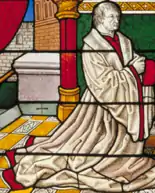Philip II of Daun-Oberstein
Philip II of Daun-Oberstein (German: Philipp II von Daun-Oberstein) (1463 – 12 February 1515) was the Archbishop-Elector of Cologne from 1508 until 1515.[1]
Philip II of Daun-Oberstein | |
|---|---|
| Archbishop of Cologne | |
 | |
| Church | Roman Catholic Church |
| Archdiocese | Cologne |
| Appointed | 1508 |
| Term ended | 1515 |
| Predecessor | Hermann IV of Hesse |
| Successor | Hermann of Wied |
| Orders | |
| Consecration | 14 November 1509 by Érard de La Marck |
| Personal details | |
| Born | 1463 |
| Died | 12 February 1515 Bonn, Electorate of Cologne |
| Buried | Cologne Cathedral |
Early life
Philip II of Daun-Oberstein was the fourth son of Graf Wirich IV of Daun-Oberstein and his wife Margaretha of Leiningen. As a younger son, he was groomed for a career in the church from an early age. He became a canon of Cologne Cathedral, and then became Domscholaster of the cathedral chapter in 1488, and then dean of Cologne Cathedral in 1489. He was also made a canon of the Cathedral of Trier.
Archbishop of Cologne
On 13 November 1508 the cathedral chapter of Cologne Cathedral elected Philip II to be the new Archbishop of Cologne after the main rival candidate, Eric of Saxe-Lauenburg (later Prince-Bishop of Münster), withdrew. He received papal confirmation on 31 January 1509 and received was consecrated as a bishop by Erard de La Marck, Prince-Bishop of Liège, on 14 November 1509. He continued the policies of his predecessor Hermann IV of Hesse, and inherited from him the controversy surrounding the independence of the city of Cologne. Philip's provincial synods are well-known.
Philip died in Bonn in 1515, and was buried next to Herman IV of Hesse in Cologne Cathedral.
References
- "Philipp II. von Daun". www.rheinische-geschichte.lvr.de (in German). Retrieved 2018-11-27.
- This page is based on this page on German Wikipedia.
- "Philipp II. von Daun". www.rheinische-geschichte.lvr.de (in German). Retrieved 2018-11-27.
| Catholic Church titles | ||
|---|---|---|
| Preceded by Hermann IV of Hesse |
Archbishop-Elector of Cologne 1508–1515 |
Succeeded by Hermann of Wied |